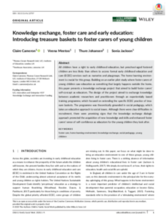

Displaying 561 - 570 of 1646
The study reported here was undertaken as part of a children’s health needs assessment in an English local authority. It sought to understand why looked after children experience such high levels of poor mental health and make growing demands on therapeutic services.
Building on an earlier pilot study where foster carers of young children saw education as something that largely happens outside the home, this paper presents a knowledge exchange project that aimed to build foster carers' self‐concept as educators.
This guidance is to support the management of children and young people living in children's homes, residential special schools and colleges, and other residential facilities during the COVID-19 crisis.
This paper offers some insight into the benefits, impacts and challenges of the ‘creative mentor’ role. It links to a social pedagogy framework, supporting practice, and draws on creative mentors’ work with children and young people living in care. It aims to inform professionals and teams around a child about the transforming nature of working with creativity – beyond the obvious external experiences.
For this study, one hundred and twenty‐six 11–21 year olds (53 who had experience of the care system and 73 who did not) were recruited from the community and NHS. All participants had self‐harmed in the past 6 months. Participants completed an Audio Computer‐Assisted Self‐interview (ACASI) regarding their views about the support they had received, how helpful it was, and what further help they felt they needed.
In the present study, six unaccompanied asylum‐seeking minors (UASMs) were interviewed and interpretative phenomenological analysis (IPA) was used as a methodology to analyse the data.
This research aimed to construct an explanatory theory of how residential staff make sense of, and use, attachment theory in practice.
In this piece for the Guardian, an anonymous foster carer writes about their experience caring for an unaccompanied asylum-seeking child (UASC) in the UK.
This paper from the Children and Youth Services Review reflects on the collective participation of young people in care in a rights-based initiative intended to facilitate input into service and policy development in Ireland.
The purpose of this study was to examine the lived experiences of posttraumatic growth (PTG) in adult survivors of institutional childhood abuse in Ireland.

